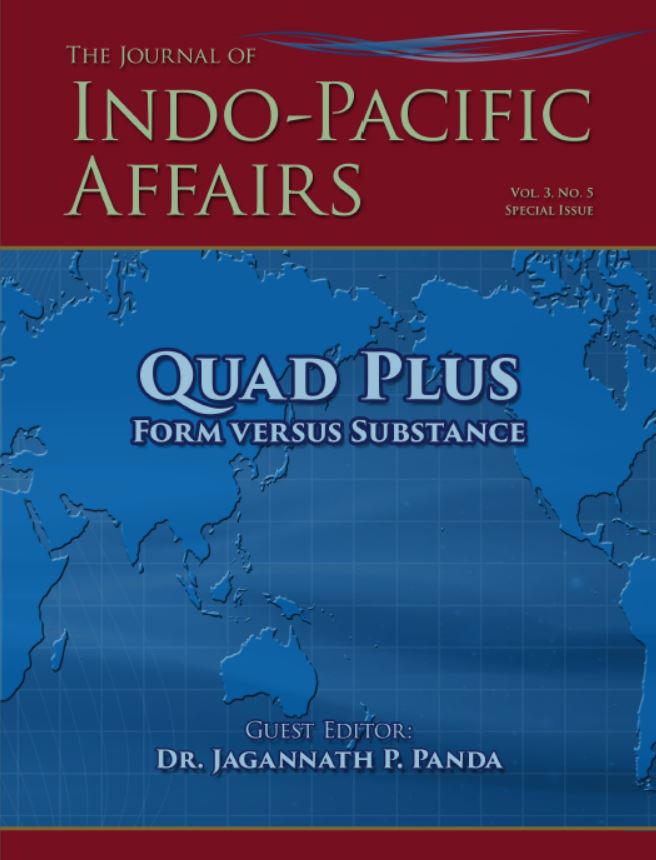France’s Indo-Pacific Strategy and the Quad Plus

In France, the launch of the Quad Plus raised little attention.
The emergence of yet another minilateral framework in the Indo-Pacific attracted some interest but also raised many doubts about the sustainability of this initiative. The general impression was that this new grouping was quite heterogeneous and maybe not the most relevant to tackle the challenge it ambitioned to address: the COVID-19 crisis. So, while it might be too soon to tell if Paris would be ready to join such a scheme, the examination of France’s various engagements in the Indo-Pacific can provide some clues regarding the synergies or divergences with the Quad Plus initiative.
In 2018, Paris unveiled its own Indo-Pacific strategy. It reflects a strategic reassessment of the region for French interests: the area is now widely acknowledged as the world economic powerhouse, and major trade partners are located there. The Indo-Pacific is also a key region when it comes to the governance of the commons and multilateralism. At the same time, there is now a recognition that China’s rise is increasingly challenging French interests in the region. Maritime security is a core interest and objective in developing an Indo-Pacific approach. The Indo-Pacific terminology serves to highlight the strategic dimension of France’s comprehensive approach to the region, by providing it with a powerful narrative. This narrative also strengthens Paris’s legitimacy to act in the area and is useful to develop and expand cooperation with like-minded partners. Through its Indo-Pacific strategy, France can thus more adequately protect its sovereign interests while promoting and advancing its very own vision for a balanced, multipolar, inclusive Indo-Pacific regional order, upheld by key liberal principles and multilateral schemes.
The French Indo-Pacific vision relies on key strategic partnerships with all the members of the Quad. However, a concern to keep its strategic autonomy in the context of a worsening US–China rivalry and the strong interest to coordinate with European partners in the Indo-Pacific explain why Paris would be reluctant to join the Quad Plus in its current form. Paris would certainly favor minilateral or multilateral initiatives in which France would find more aligned interests and retain greater autonomy, as well as a deepening of the bilateral relations with the members of the Quad Plus and ad hoc coordination on specific issues.
> Read the whole article on the website of the Journal of Indo-Pacific Affairs.

Available in:
Regions and themes
Share
Related centers and programs
Discover our other research centers and programsFind out more
Discover all our analyses
China’s Strategy Toward Pacific Island countries: Countering Taiwan and Western Influence
Over the past decade, China has deployed a diplomatic strategy toward the Pacific Island Countries (PICs). This strategy pursues two main objectives: countering Taiwan's diplomatic influence in the region and countering the influence of liberal democracies in what Beijing refers to as the "Global South."

Opening up the G7 to South Korea to Address Contemporary Global Challenges
The G7’s global influence has diminished as powers like China reshape international governance through initiatives such as BRICS and the Shanghai Cooperation Organisation (SCO). With the G7 now representing just 10 per cent of the world’s population and 28 per cent of global GDP, its relevance is increasingly questioned.
Expanding SPDMM as a pivotal institution in the Pacific – A French perspective
The South Pacific Defence Ministers’ Meeting (SPDMM) is the only forum that brings together defense ministers from the wider South Pacific — including Chile, which is hosting it for the first time. This heterogeneous group of countries with varying resources, capacities, and interests — Australia, Chile, Fiji, France, New Zealand, Papua New Guinea (PNG), and Tonga — are united by their shared determination to strengthen cooperation on maritime security and humanitarian assistance and disaster relief (HADR) activities.
EU’s Derisking From China: A Daunting Task
With economic security as a major concern, the EU has recently turned to “derisking” from China. The EU strategy entails reducing critical dependencies and vulnerabilities, including in EU supply chains, and diversifying where necessary, while recognizing the importance and need to maintain open channels of communication.










